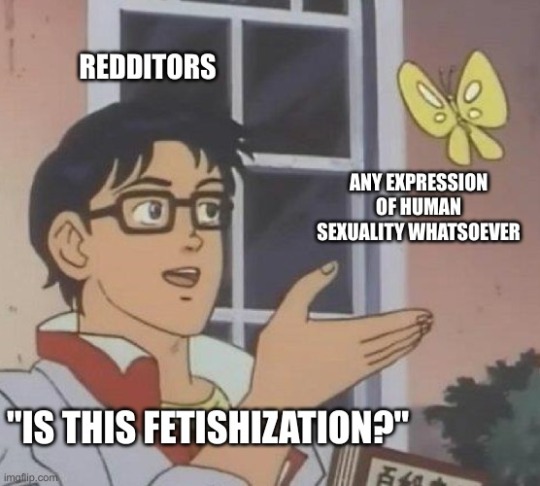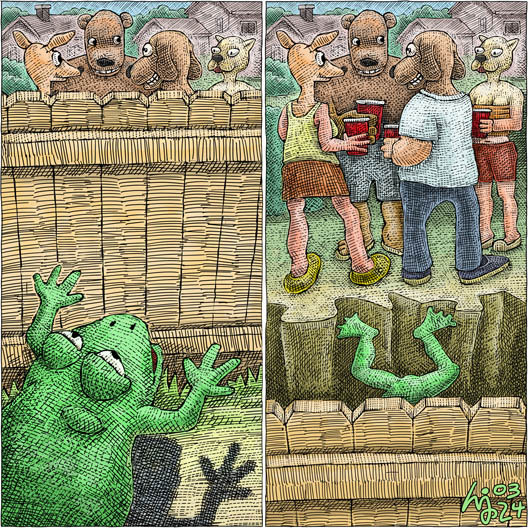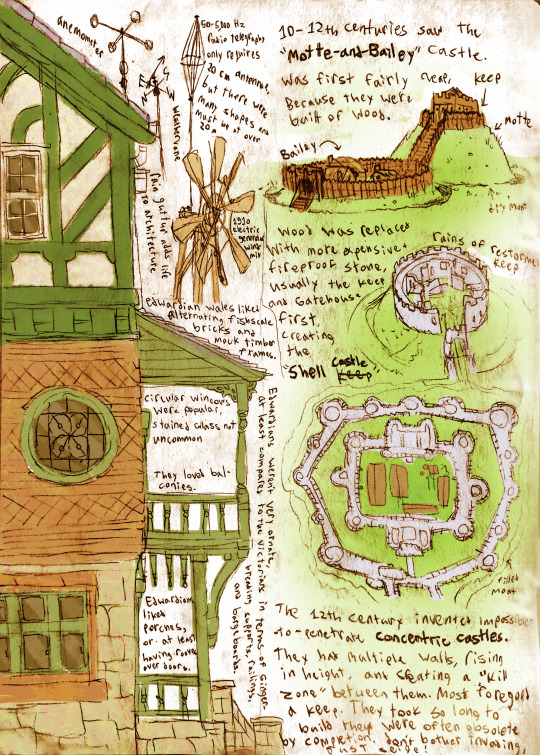#motte-and-bailey
Text
How hard can it really be to build the perfect castle? Here are some of the biggest innovations in castle building anyone interested in finding out needs to know.
#castle#motte-and-bailey#Normans#towers#moats#gatehouse#medieval history#middle ages#feudal France#ancient#history#ancient origins
30 notes
·
View notes
Note
Is there a specific word/concept for "dogwhistles, only positive?" Because between hearing about TERFs plotting to put "terfs don't interact" on their own damn posts, and the Theosophical Society having a literal "Freedom of Thought Statement" claiming that "we don't consider Blavatsky or anyone else our sole authority, so we really do want you to think for yourself! Honest!!!1", I've realized I'm pretty damn susceptible to bigots repackaging my moral compass into bait for their propaganda.
I can't think of one that's specific to this exact thing, but I can think of a few things that could be related to the kind of thing you're doing.
The term "bait and switch" is used to describe when someone dishonestly offers a product they don't actually have; then when they have the customer's attention, try to sell them something else. Maybe something like "value baiting" could describe what you're seeing?
There's also the motte-and-bailey defense (also called the "motte-and-bailey fallacy," but I find that it's very often just part of DARVO) where people proposing or advocating something objectionable pretend they just want something that sounds fairly harmless, even reasonable. For example, "we want to eliminate all [insert minority here]" is the kind of sentiment that turns most people off and attracts a lot of criticism, so when it inevitably does you'll often see the people who hold it "retreat" to a more defensible position such as "we just want to protect the children!", "we just want to protect our culture!", or "we just want to worship God in peace!"
There are some cases where something that might appear to be value baiting is genuinely what someone believes. For example, many conspiracy theorists often believe that they are the only free thinkers in the world, and believe that if everyone else was set free from manipulation and mind control, they would believe exactly as the conspiracy theorists do. There's usually a lot of Dunning-Kruger effect at work here, because they often just don't know enough to really comprehend why anyone would or could disagree with them unless they were brainwashed, or a brainwasher.
This is all I've got. Maybe some of my followers have suggestions?
32 notes
·
View notes
Text

every time i go back to the subreddit, somebody is saying this shit. it's so tiring.
the term "fetishization" is completely meaningless at this point.
fun fact: you can simultaneously be attracted to someone AND love them for who they are! these things aren't mutually exclusive, and finding certain traits sexually attractive does *not* imply a lack of respect for people with or without those traits, remotely, at all, in any way whatsoever!
#196#196 campfire#and don't even get me started on the people using the existence of asexuality as a motte and bailey tactic to hide their neopuritanism
139 notes
·
View notes
Text
There's a certain type of person who's like . . . "Well, atheists/skeptics are joyless close-minded assholes. I mean, OBVIOUSLY religion/superstition isn't LITERALLY real, only an IDIOT would think anyone was taking it LITERALLY, you only believe that people mean what they say because you're only familiar with Christianity, everyone ELSE is using religion as some kind of extended metaphor for humanity or just believing in things for funsies"
And it's like . . . a) that's frankly more insulting than anything I was probably saying and b) if you also don't believe something is literally true why are you getting so mad that I am saying that something is not literally true
#it's like a motte and bailey argument where they mean everything literally#until you try to point out that they're just plain wrong at which point they were only speaking metaphorically; OBVIOUSLY.#thinking back to that one time a popular tumblr user got in an argument with someone about whether animism was 'true'#and the popular blog kept waxing poetic about souls and colonies of bacteria and lichen and how#just because that's not the words indigenous people used doesn't mean that isn't what they meant when they said rocks were alive#and the other person was like . . . no. animism suggests that rocks have souls. and they don't#and people got SO MAD#atheism#skepticism umbrella
65 notes
·
View notes
Note
How easy was it for attackers to set a wooden castle on fire? Doesn't seem all that defensible long-term.
Not as easy as you might think.

Keep in mind, the wooden walls of a motte-and-bailey aren't modern treated wood panels that have been treated with petroleum (this is a major reason why 5 over 1s keep burning down while under construction). They're essentially tree trunks with the bark still on them, which means they're a bit slow to light, especially when the fires in question are rather small (say from fire arrows) or don't have the best accelerants (a bundle of straw soaked in pitch would be the best you could do).
And then there's dealing with the defenders, who will be trying to kill you if you get close enough to the walls, and who will definitely try to make their castle harder to burn down by dousing any fires, soaking the wood in various liquids, covering the wood with hides, etc.
68 notes
·
View notes
Text
really wish that instead of 'zionist' people would just write what they mean. otherwise i'm just incredibly confused.
for example, instead of "zionist pig", try saying:
"pig who thinks-israel-should-be-home-to-the-jewish-people"
"pig who supports-the-development-of-israel"
"pig who thinks israel should exist"
"pig who lives in israel" (that one probably isn't kosher though)
"jewish pig"
"jew-supremacist pig"
"pig who-supports-the-murder-of-innocent-palestinians"
etc.
it would make it much easier to differentiate between legitimate criticism of israel and antisemitism, and much easier to actually understand what position you're supporting.
unless... no... it can't be... surely no one would use that vague phrasing as a tactic just to be an anti-semite with plausible deniability... right?
#zionism#antizionism#motte and bailey argument#seriously though i really have no idea what people mean when they say zionism#someone please explain#antisemitism
27 notes
·
View notes
Text
this one guy yells 'medieval castle' at me every time he walks bpast me someone help. hes not even getting it right im the armour guy not the castle guy
#i know next to nothing about castles actually#all i know is what a motte and bailey is. vaguely.#knightposting
3 notes
·
View notes
Text
A MOTTE AND A MOAT
“It is difficult to find happiness within oneself, but it is impossible to find it anywhere else.”“The safest way of not being very miserable is not to expect to be very happy.”“A man can do what he wills, but he cannot will what he wills.” “Every man takes the limits of his own field of vision for the limits of the world.” ― Arthur Schopenhauer
We all—except Arthur—try to fit in, to find others…

View On WordPress
#Arthur Schopenhauer#camaraderie#empathy#fantasy#good old days#memories#middle aged#motte and bailey#reciprocal altruism#ROI#social beings#society#youth
3 notes
·
View notes
Text

doing a lil research for designing Dalv's edwardian manor/ancient castle/doomsday bunker :]
#dont bother trying to read the words. dont do that to yourself.#digital art#concept art#edwardian architecture#motte and bailey#castle design#history#dalv zilchester
21 notes
·
View notes
Text
The irony that there are so many terminally online primitivists.
#anti-primitivism#terminally online#anti-technoaddiction#i used to be one of those#i could do a whole write-up on psychology behind it but I dont really want to right now#not to mention that as an offline ideology primitivism is practically nonexistent#i dont think i have ever seen any ideology as blatantly based on aesthetics first and foremost as primitivism#maybe modern online monarchists#postmodernity#not to mention the mott-and-bailey arguments that would make TERFs blush
5 notes
·
View notes
Text
I've also never actually seen the reference to an IRL ass-kicking actually mean "I think those are fighting words"
4 notes
·
View notes
Text

youtube
Peter Boghossian lays bare glaring fault in 'inclusive conversations' - 'That's not what it means!'
John Cleese: Peter Boghossian. Philosopher, author.
Peter Boghossian: That's me.
Cleese: Acrobat?
Boghossian: No, no, no.
Cleese: I was misled. Alright. Peter, you studied this.
Boghossian: I have.
Cleese: How did we get here? It's a very powerful movement. Nobody sort of signed up for it, and we are learning every day about "inclusion" and "diversity" and "anti-racism" and all that. And it's kind of arrived without anyone quite knowing where it came from. It reminds me a bit of that thing in Holy Grail when Arthur says, "I'm the king," and they say, "well we didn't vote for you." We didn't vote for this did we?
Boghossian: No, it did not come as a result of a democratic process. It blitzkrieged society in the last 10 years. And so the words that you mentioned are one of the reasons that it's spread throughout the society. "Inclusion," "equity," "diversity," "anti-racism." People thought they were signing up for something different. They're getting something that they did not sign up for. They've been hoodwinked. They've been bamboozled by these words.
Cleese: Ah, you say "woke" and it means kind, and you finish up with authoritarianism.
Boghossian: Correct it's similar in that the words have two meanings. The meanings that people sign up for and then the secondary meaning.
So, for example, "inclusion." When normal people who are not steeped in this, they hear the word "inclusion," they think, "oh well, inclusion that sounds like a great thing, we we want to include people in wheelchairs, we want to include people of all skin colors, we want to include people of all heights of different ethnicities." Everybody agrees to that, every sane person will sign up for that. But what inclusion actually means -- so think about it like this: if we want to have an inclusive conversation, let's say we wanted to bring folks into our conversation, we wanted to include them, well, to make sure that they felt included, they have to feel welcome. So, to make sure that they feel welcome, we have to make sure that they don't feel offended. An inclusive space means a space where you restrict speech. A conversation in which speech is restricted. But people think they're getting a conversation in which all people can sit at the table and have a conversation, a discourse, as equals. That's just not what it means.
So, for example, when you see the word "equity," most people confuse -- and it's a very simple confusion…
Cleese: What it means to me, it means fairness.
Boghossian: Yeah, that's the exact opposite of what it means. So, "equity" used to be a finance term, you know, you had so much equity in your home and that's how most people understood the term until very, very recently. So, equity and equality are not the same things. In fact they're exactly the opposite.
Cleese: They're the opposite.
Boghossian: Yeah.
Cleese: Okay, go on.
Boghossian: Okay, so equality means treating citizen one and citizen two equally. They get treated equally. That's what equality means. Equity means the redistribution of shares, redistributing something in society, to have an equal outcome. For example, if you have so many members of a minority community in a society, you would want either a proportional representation -- so let's say that you have 13% of your population is African-American -- you would either want a proportional representation, which is a kind of equity. But what you would really want is to look at the historical characteristics of the people. So, if someone's ancestors for example, were enslaved, you would want those individuals to be disproportionately represented in --
Cleese: Disproportionately? Not 13%, but higher.
Disproportionately. Higher. Higher, Correct.
Cleese: That's reparations?
Boghossian: It's a kind of reparation, but it's an equitable system. So you could think about it like this. Ibram X Kendi, the multiple, massively best-selling author, succinctly captures "equity" as: "the only remedy to past discrimination is present discrimination." The only remedy to the injustices to -- the clear and obvious injustices, and people were treated horrifically on the basis of skin color, nobody's denying that -- the only remedy to that is present discrimination. And future discrimination. But that itself is not fair. Right, that's equity. And so that's another word.
So that's how people have been bamboozled, they've been hoodwinked by "inclusion," they've been hoodwinked by "equity," they've been hoodwinked by "diversity," by "anti-racism," they've been hoodwinked by all…
Cleese: "Diversity," give me an example from "diversity."
Boghossian: For example, in this conversation we want diversity. So ideally, what you would want is you would want a conversation in which all voices could be heard, in which people who have different interests, different class interests, different -- whatever interest, would come and they'd be able to freely participate in an exchange of ideas.
Cleese: Incidentally I wrote a little book on creativity, and I made that point. That the most creative groups, the ones that are most most diverse.
Boghossian: Yeah, and my guess is, I haven't read your book, I apologize, but my guess is that, what you mean by that is also intellectual diversity.
Cleese: Well that's where, yes, you want diversity of ideas.
Boghossian: Correct.
Cleese: You don't want a lot of culture-clash, which is why the guy in charge of the meeting is so important, but if you get diversity of ideas, then you get the most creative groups.
Boghossian: Right, so you just beat me to it. So, "diversity" means intellectual homogeneity. It means that people forward, they have the same ideas, and they forward the same ideas, and the ideas that people forward are basically one kind of a narrative based in the ideology. So, diversity doesn't mean people of different skin colors. If anything, it means people whose ancestors were marginalized, who have the same opinion. That's why, for example, black conservatives, if you put black conservatives on a panel, that's not diversity. You have to have the same opinion.
"Diversity," "inclusion," "equity," these words are simply not what people think.
Cleese: And "anti-racism"?
Boghossian: "Anti-racism" is another one. The idea is that racism is ever-present in a system. So, you can have a system in which there are no conspicuous racists, actual racists, but the system itself is racist. It's not if racism occurs, racism is the default. But it's how it occurs. And you just spoke with Helen who has a lovely example of this in that, a store owner of a small store is standing around, and at the same time two customers come through the door, a black customer and a white customer. Well, who does the store owner help first? If she helps the white customer, she only helped him first because he's white. But if she helps the black customer, she did that because she's afraid that the customer is going to shoplift. So, no matter -- so the default condition is that the system itself, that racism is always operative, and you need to be trained to uncover it.
Cleese: So it's like -- oh Charlie, you got a furball. Oh, poor old Charlie. Maybe he's having problems digesting some of the woke ideas.
Boghossian: Charlie's had enough wokeism.
#John Cleese#Peter Boghossian#The Dinosaur Hour#diversity#equity#inclusion#diversity equity and inclusion#antiracism#antiracism as religion#equivocation fallacy#motte and bailey#wokeness#woke#wokeism#cult of woke#wokeness as religion#religion is a mental illness
6 notes
·
View notes
Video
youtube
STAR TREK Logical Thinking #57 - The Motte-and-Bailey Fallacy
2 notes
·
View notes
Text

A renaissance painting 🥰
#mischief theatre#mischief movie night in#nancy zamit#charlie russell#rhyanna alexander davis#niall ransome#rumpole of the motte and bailey
18 notes
·
View notes
Note
"Like is it that hard to accept that maybe spending your whole life in a Christian nation may have affected your worldview somewhat" fucking wheezing about this one; sir are you aware that pretty much all Americans and Europeans have spent their whole life in a christian nation; including Jews; including muslims; including literally everybody; but somehow I only ever see this label applied to atheists so "spent their whole life in a christian nation" is apparently not what they mean lol
The funniest thing about it is that when you ask outright if "cultural Christian" applies to other religious minorities, about half the responses will be "well obviously it does, everyone in America is a cultural Christian" and the other half will be like "well obviously it doesn't, that would be ridiculous and offensive".
At this point the argument is less about whether it's an appropriate term to use and more about if it even has a useful meaning, and given that everyone is using a different definition, half of which are mutually exclusive, I think it's safe to say that it's not. Put it on the shelf of terms diluted to uselessness with "gaslighting" and "narcissism".
88 notes
·
View notes
Text
Thanks to contrapoints, everybody thinks they know what a Motte & Bailey argument is, and are gleefully accusing other people of using this argument structure. Now I love rhetorical literacy, but a lot of people don't seem to have understood the point.
When identifying a Motte & Bailey argument, ask yourself: are they deceptively attempting to support their least defensible claims by falsely equating them to their most defensible claims, or are they just front-loading their most defensible claims and using those as a jumping-off point for further argumentation?
5 notes
·
View notes